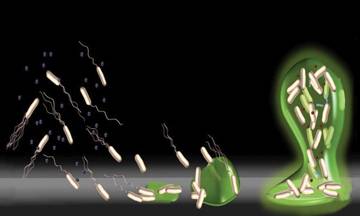
Bacteria can grow either as isolated cells swimming in their environment (planktonic mode) or attached to a surface (sessile mode) where they form layers of cells called biofilm. When microbes grow in biofilms they increase endurance to many stresses and usually are more resistant to antibiotics. In fact most chronic infections caused by microorganisms are associated with bacterial biofilms but the molecular and biological mechanisms are not fully understood.
Now, researchers from Cecília Arraiano Lab at ITQB NOVA, with collaborators from Germany and Switzerland, have unraveled the role of the transcription factor BolA in this process. Bacteria have an intracellular signaling molecule (c-di-GMP) important for the onset of biofilm formation. It was shown that BolA is able to regulate the levels of c-di-GMP making it a key player in the process. The results were published in mBio, an open access publication of the American Society for Microbiology of streamlined review and publication of the best research in microbiology.
"We have discovered the importance of an accurate cross talk between BolA and c-di-GMP for the regulation of these bacterial lifestyles and establishment of biofilms", adds Cecília Arraiano, corresponding author of the paper. "The relationship between these molecules gives new perspectives regarding the control of biofilm formation and will certainly have important consequences for human health."
Cecília Arraiano’s team is formed by Ricardo N. Moreira, Clémentine Dressaire, Susana Barahona, Lisete Galego, Volkhard Kaever and Urs Jenal.
Source: ITQB